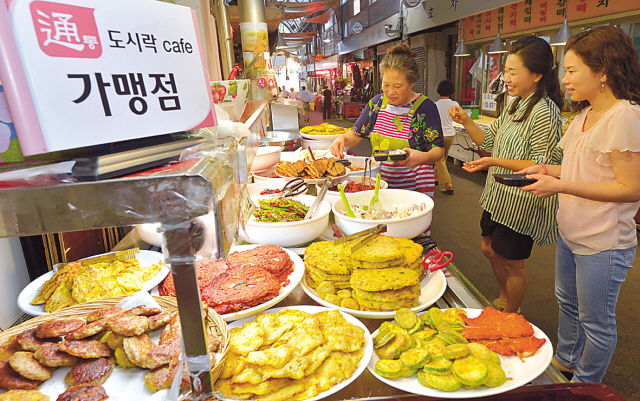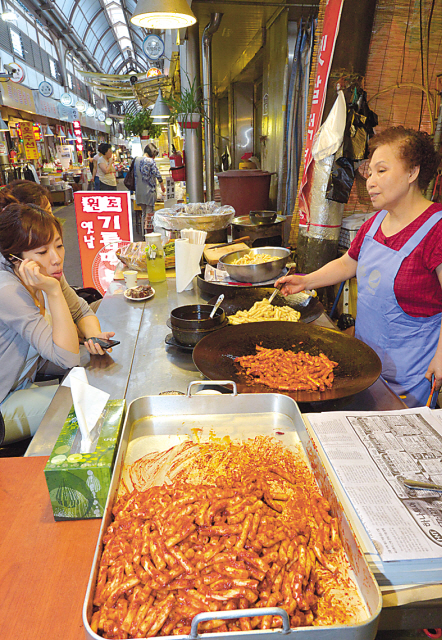
Is Dosirak Cafe Tong one way to help revitalize traditional markets?
This year a new traditional market has been getting noticed.
Ever since a small do-it-yourself eatery opened in Tongin Market (a small 75-store covered arcade located near Gyeongbok Palace in Seoul), press coverage has been deafening.
Though the basic concept behind Dosirak Cafe Tong is not necessarily new (both Noryangjin Fisheries Wholesale Market and Majang Meat Market sport similar hands-on venues) ― people are buzzing about the novelty of its fare, the catchy set-up and the wallet-friendly pricing.
If Noryangjin Fisheries Market customers can self-select seafood and eat it at one of the market’s restaurants and Majang Meat Market patrons can buy meat at wholesale prices and grill it at a shop located within, Tongin Market diners can load up on their choice of banchan (side dishes) from the cafe’s affiliate stalls and dig in.
“You come to the cafe and buy tokens,” Tongin Community marketing team head Kang Hye-ryeon, 39, explained how the Dosirak Cafe works.
“We recommend purchasing 5,000 won worth of 500 won tokens. Then you take those tokens and go to affiliate shops with a tray and buy what you want to eat, return to the cafe with the remaining tokens and get rice for 1,000 won and soup for 1,000 won. Kimchi is provided free of charge.”
“It is like a buffet, so many people call it ‘dosirak (which means ‘lunch box’ in Korean) buffet,’” said aec Bibitpam CEO Yoon Hyun-ok, who acted as culture planner for the Tongin Market Project that started last March and ended this April.
“It is good because you can choose what you want to eat and enjoy a hearty, filling meal,” Yoon, 52, added. “Plus the cafe is very cheap.”
Yoon stressed that the two primary draws of Tong is the fact that you can enjoy a meal for a reasonable 5,000 won and custom-tailor it to your own personal preferences.
When Dosirak Cafe Tong was launched in January, no one could have guessed that it would take off in a major way come March.
This year a new traditional market has been getting noticed.
Ever since a small do-it-yourself eatery opened in Tongin Market (a small 75-store covered arcade located near Gyeongbok Palace in Seoul), press coverage has been deafening.
Though the basic concept behind Dosirak Cafe Tong is not necessarily new (both Noryangjin Fisheries Wholesale Market and Majang Meat Market sport similar hands-on venues) ― people are buzzing about the novelty of its fare, the catchy set-up and the wallet-friendly pricing.
If Noryangjin Fisheries Market customers can self-select seafood and eat it at one of the market’s restaurants and Majang Meat Market patrons can buy meat at wholesale prices and grill it at a shop located within, Tongin Market diners can load up on their choice of banchan (side dishes) from the cafe’s affiliate stalls and dig in.
“You come to the cafe and buy tokens,” Tongin Community marketing team head Kang Hye-ryeon, 39, explained how the Dosirak Cafe works.
“We recommend purchasing 5,000 won worth of 500 won tokens. Then you take those tokens and go to affiliate shops with a tray and buy what you want to eat, return to the cafe with the remaining tokens and get rice for 1,000 won and soup for 1,000 won. Kimchi is provided free of charge.”
“It is like a buffet, so many people call it ‘dosirak (which means ‘lunch box’ in Korean) buffet,’” said aec Bibitpam CEO Yoon Hyun-ok, who acted as culture planner for the Tongin Market Project that started last March and ended this April.
“It is good because you can choose what you want to eat and enjoy a hearty, filling meal,” Yoon, 52, added. “Plus the cafe is very cheap.”
Yoon stressed that the two primary draws of Tong is the fact that you can enjoy a meal for a reasonable 5,000 won and custom-tailor it to your own personal preferences.
When Dosirak Cafe Tong was launched in January, no one could have guessed that it would take off in a major way come March.

“For the first month and a half after Dosirak Cafe opened we got about 30 customers a day,” Tongin Market Merchant Association head Jeong Hung-woo revealed. “Those were tough times.”
Now, according to Kang, “lots of people come on Saturdays, around 500 to 600. On weekdays around 150 to 200 people come.”
“On weekdays, office workers and Korean visitors come, while families, residents and foreign tourists come on the weekends,” said Jeong.
The result of a collective effort by the city-sponsored Tongin Market Project team and the Tongin Market Merchant Association-run organization Tongin Community, the cafe is a part of a series of changes that are being made to help pump more life into the market.
The Tongin Market Project was commissioned by the Seoul Metropolitan Government last year to help revitalize the storied arcade in various sustainable and cultural ways.
Shortly after the Tongin Market Project began, the Tongin Community ― which was selected by the Ministry of Public Administration and Security and the Seoul Metropolitan Government for financial support as part of a project devoted to fostering culture and art in traditional markets ― was established.
Run by the Tongin Market Merchant Association, Tongin Community oversees the Dosirak Cafe as well as a do-it-yourself workshop where the public and merchants can build their own crafts.
The community also oversees a delivery system where customers can either contact the community or ask the merchant for goods to be delivered within Jongno-gu.
All these efforts seem to have a positive effect on the market as a whole.
“The market is getting more invigorated,” said Dosirak Cafe Tong affiliate shop Countryside Banchan owner Kim Nam-soon, 60. “Many people are coming from afar.”
Kim sees Tong as one of the reasons behind this change.
Kim said she has witnessed an increase in the number of customers who frequent her store.
“Sales have gone up, though actual profit has not gone up as much,” Kim said.
To meet demand and to keep regulars coming, Kim has upped the number of banchan sold, keeps the popular sides on the menu and changes one to two of the sides daily.
“With the increase in customers, merchants are getting more feedback,” said Jeong of the changes he is witnessing.
There are currently 15 cafe-affiliates that specialize in everything from banchan to street snacks to traditional desserts.
Not everyone, however, has seen major benefits from the changes. Non-affiliate stores, in particular, may be less directly affected by Tong’s success.

Non-affiliate shop Hyoja-dong Old School Tteokbokki owner Jeong Wol-seon, 66, said, “We have not experienced a change in business after the Dosirak Cafe opened.”
That may change.
Yoon revealed that Japanese tourists are not just coming to eat at the cafe, but are coming to buy market products like dried laver and sesame seed oil.
Given that, it makes sense as to why the ultimate goal, according to Yoon, is to turn Tongin Market into a tourist stop, especially because it is situated near many sightseeing spots.
It also helps that the market itself boasts a long history, from its days as a public market during the Japanese colonial period to its days as an alley-style market for nearby residents in the 1960s.
Now, a “village market” that primarily caters to those who live in its neighboring environs, the market’s storied legacy still remains alive and kicking as evidenced by places like Hyoja-dong Old School Tteokbokki, one of two establishments that specialize in what is considered a Tongin Market specialty ― “gireum tteokbokki.”
Gireum tteokbokki ― unlike the more standard version ― is not soupy or studded with fish cakes.
Made by adding a bit of oil to a hot wok (usually the inverted lid of a cast-iron cauldron) and then tossing in thin, long strips of tteok that have been seasoned with soy sauce or red chili pepper, it is sizzling and crisp on the outside, and chewy in the middle.
Owner Jeong remembers when she used to watch gireum tteokbokki being grilled over a briquette fire as a child when she lived in this neighborhood.
In Yoon’s opinion, it is stories like that, that can help enliven the marketplace.
“This is a village market so it is important to foster a sense of community through storytelling and cultural services,” said Yoon.
In the meantime, merchant association head Jeong revealed that efforts are being continually made to improve the market.
Various ideas are being taken into consideration, like listing what ingredients go into each side dish, said Jeong, who added that there are plans to hold a coffee workshop starting next month.
Has the government’s decision to have large discount retailers and supermarkets close on two Sundays of every month to help foster business for traditional markets had any impact on Tongin Market?
Jeong says it is too early to tell.
“We need one to two months to know if it will have any effect on the market,” he said.
Tongin Market; 10-3 Tongin-dong, Jongno-gu, Seoul; (02) 722-0911; tonginmarket.co.kr; closed every third Sunday of each month. Dosirak Cafe Tong opening hours are from 11 a.m. to 4 p.m. Mondays through Saturdays.
By Jean Oh (oh_jean@heraldcorp.com)
-
Articles by Korea Herald




![[KH Explains] No more 'Michael' at Kakao Games](http://res.heraldm.com/phpwas/restmb_idxmake.php?idx=644&simg=/content/image/2024/04/28/20240428050183_0.jpg&u=20240428180321)






![[Grace Kao] Hybe vs. Ador: Inspiration, imitation and plagiarism](http://res.heraldm.com/phpwas/restmb_idxmake.php?idx=644&simg=/content/image/2024/04/28/20240428050220_0.jpg&u=)







